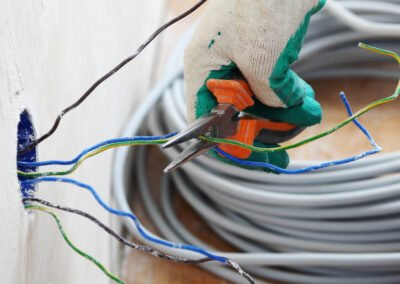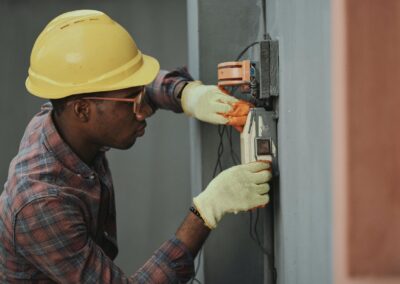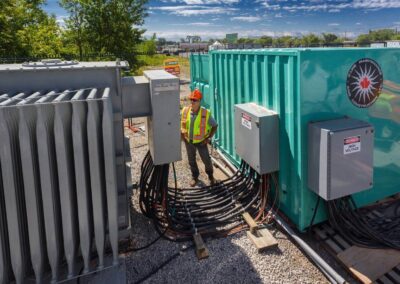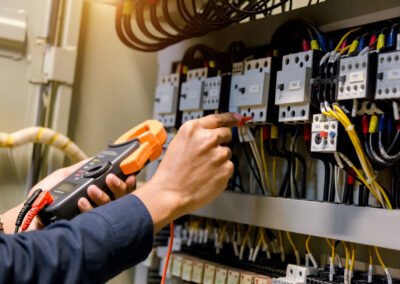Mobile Commercial Wiring, Oakville
Though electrical wiring in a residential facility is a fairly straightforward procedure, wiring for a commercial property is usually more complex, and requires the expertise of a skilled and knowledgeable electrician.
Request InformationSchedule Service
Mobile Commercial Wiring, Oakville
To guarantee that the work is conducted safely when it comes to electrical wiring, it is always vital to contact a licenced electrical contractor. Although installing electrical wiring in a home building is a reasonably simple process, installing wire in a commercial building is typically more complicated and calls for the skills of a qualified electrician. Additionally, there are many kinds of electrical wiring for commercial buildings that account for the various configurations that could be required to support large machinery or equipment.
Raceways and conductors, busways, and cable assemblies are the three primary techniques for electrical wiring in commercial structures.
Raceways and Conductors
When it comes to electrical wiring, the raceway and conductor system is among the most popular. A conduit or tube with numerous insulated phases and an equipment grounding conductor are typically used in conjunction with raceways and conductors. Depending on the requirements and specifications of the commercial property, the actual design and installation may differ.
THHN/THWN (thermoplastic heat and water-resistant nylon jacket/thermoplastic high heat-resistant nylon jacket) or XHHW (XLPE high heat-resistant and water-resistant) in copper or aluminium are the most popular types of conductors. Typically, copper is utilised for branch circuits whereas aluminium is used for feeders.
Raceways and conductors have the benefit of allowing for circuit layout adjustments, and they are simple to implement for remodelling projects. On the other hand, some drawbacks include expensive installation costs and a challenging installation procedure because of stricter routing specifications.
Busways
A busway is an enclosed raceway that has busbars mounted from the factory. Feeder style and plug in style are the two basic busway variants that are compatible with insulated or bare wires. The busway approach has the benefit of being smaller and more cost-effective than several conduits, with ampere values ranging from 60 to 4,000 A. Additionally, the overall voltage drop is less significant when busways are used.
In contrast, busways have a larger installation cost and, depending on how the property is laid out, less room for bus plugs. Additionally, water leaks on the premises may put busways at risk of collapse.
Cable Assemblies
A cable assembly is yet another typical kind of commercial electrical wiring. A bare and/or insulated equipment grounding conductor is found in cable assemblies together with numerous conductors (both neutral and insulated phase). It is necessary to sheath and encapsulate exposed grounding conductors, whether they are made of metal or another material. Custom cable assemblies are available and frequently use THHN/THWN or XHHW-2 (copper or aluminium) conductors.
The use of cable assemblies has a number of benefits, including less expensive installation, speedier installation, and flexible wire routing. The fact that circuit layout adjustments are not allowed once installation is complete and that additional preparation is necessary during the setup and cable procurement stages is, on the other hand, a drawback.
There may be additional viable alternatives to the three commercial wiring techniques that are most frequently employed. Made Electric is able to walk you through all wiring options and provide advice on the ideal setup for your business property. Do not hesitate to contact MADE ELECTRIC now! We are a seasoned, ESA-licensed business that offers excellent service in both commercial and residential settings. Our staff is based in Oakville and the GTA, and we are dedicated to assisting you in meeting all of your needs.
Frequently Asked Questions (FAQs)
How does commercial electrical rewiring differ from residential electrical wiring?
While most residential projects require single phase power, commercial wiring typically uses 3-phase power. Residential electricians can work on electrical systems which are smaller than commercial systems, with a voltage as high as 240V, while commercial electricians work on wiring systems which are much larger and complex.
Which electrical wiring method is best for my commercial property?
The three main methods for electrical wiring in commercial spaces are raceways and conductors, busways and cable assemblies. If you are unsure of which method is best for your property, don’t hesitate to contact us and we can advise and guide you through the installation process.
Are there other types of wiring methods for commercial properties?
The three main methods for wiring commercial properties (raceways and conductors, busways and cable assemblies) are the most commonly used methods in industry. However, alternate configurations are possible, and we will work with you to find a custom configuration that suits your property best.




